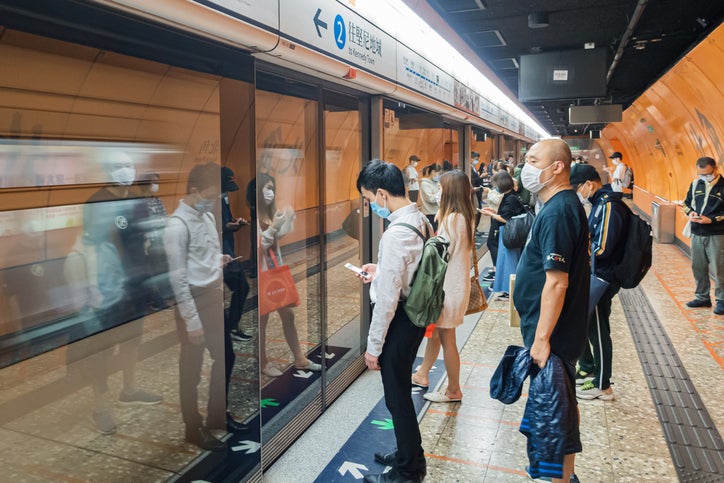The UK should follow Hong Kong’s lead in controlling coronavirus and sending people back to the office
It would be a fundamental mistake not to draw on the strategies used in Asia to tackle Covid-19, and businesses will fail if the government continues down the wrong path, writes James Foster

Boris Johnson has once again sent office workers home, to the detriment of productivity and the countless thousands of businesses that rely on their footfall. Yet, where I am working in Hong Kong, we’ve been operating in offices for the past two months, safely and with little incident.
The UK could soon see industries collapsing one after another, while it’s business as usual in many parts of Asia.
Why? While Asian governments have taken decisive, proven steps to eradicate the virus, the UK has dithered and delayed.
The countries took different strategies from the beginning. When reports of the virus emerged, Hong Kong locked down and the UK didn’t. Hong Kong has vast experience of other novel viruses and so was well prepared. The UK, with less experience, headed into the pandemic blindly, and its lockdown came far later and was less aggressively enforced.
Behind each lockdown was a different strategy. The UK locked down to suppress the disease. In east Asia, the strategy was virus elimination. Once you have eliminated the virus, tracing cases and preventing outbreaks becomes infinitely easier and life can swiftly return to normal.
The contagiousness of Covid-19 makes it difficult to sustain elimination, but it can be managed so that day-to-day life, and office life, can resume. In Hong Kong, everything is open, yet there have been only 104 deaths. In Vietnam, there have been only 35 coronavirus-related deaths, and Taiwan has recorded just seven.
The comparison between Hong Kong and the UK is particularly striking because both are major trading nations and transport hubs. Overseas visitors are a big source of potential transmission.
If you travel to Hong Kong, you must take a polymerase chain reaction (PCR) test within 72 hours of travelling to show that you don’t have Covid-19, and then there is a strict quarantine on arrival. This quarantine is enforced so you don’t see a scenario like Bolton’s superspreader, where a man returned from abroad and went on a pub crawl.
In Taiwan, I saw first-hand the speed of the response as I was ushered on to the last plane allowed to leave before the airport was closed. Robust responses like this are the norm in this part of the world. The testing rules and enforced quarantine measures mean that travellers need only self-isolate for a period of five days, making international travel for business a realistic possibility.
PCR testing is not expensive, and travellers would willingly pay to have a test at UK airports. Right now, people can go in and out of the UK untested. As long as there is no control at airports, there will be a continuous cycle of cases whatever else you do.
There isn’t enough community testing in the UK either. This bred a palpable lack of confidence and reluctance when workers were encouraged to return to the office.
Meanwhile, government guidelines for firms didn’t spell out clearly what they should do to make offices safe, or signpost cleaning and testing equipment. This meant they were reluctant to call workers back. Many small and medium-sized enterprises (SMEs) we spoke to said they are worried about lawsuits if their employees get infected at work.
By contrast, when I go to an office in Hong Kong, it will have been cleaned using hi-tech equipment and UV lights. I myself will be temperature checked, often multiple times, just as I was on my journey into the office this morning.
I will also have logged where I was for contact-tracing purposes through my mobile phone, which tracks my movements using sophisticated data analytics, another area where the UK lags far behind.
Unlike in March, the UK now has the benefit of examples from other countries of how outbreaks can be brought under control. For the UK not to draw on these strategies would be a fundamental mistake.
Offices exist for a reason and businesses will fail if the UK continues this way. The hospitality industry, in particular, is reliant on office workers. If one sector fails, you will see a different kind of economic contagion, with failures in the restaurant industry hitting the food and drink industry, including production, farming and manufacturing. They will fall like dominoes, leading to an economic catastrophe.
The UK needs to find a way to break the testing deadlock by importing millions more tests. Contact tracing should not be an afterthought but at the forefront of Covid-19 strategy.
Next time the government wants offices reopened, widespread testing at the nation’s borders should be in place. It must provide clearer instructions on what steps businesses should take, and outline the equipment that will play a role in cleaning and safety.
The reasons for Hong Kong’s success are obvious. The UK needs a quick reversal of strategy to get the virus, and the economy, back under control.
James Foster is CEO of the PPE manufacturer ViraxCare




Join our commenting forum
Join thought-provoking conversations, follow other Independent readers and see their replies
Comments